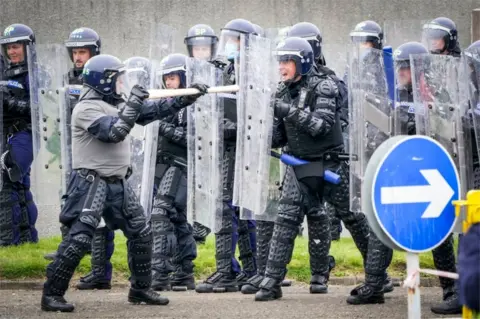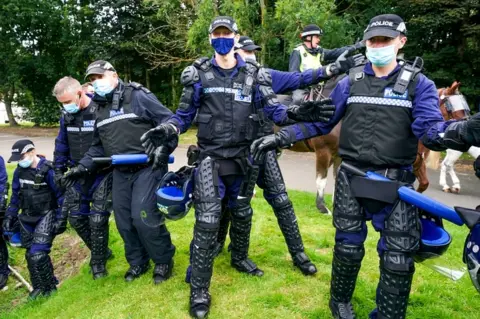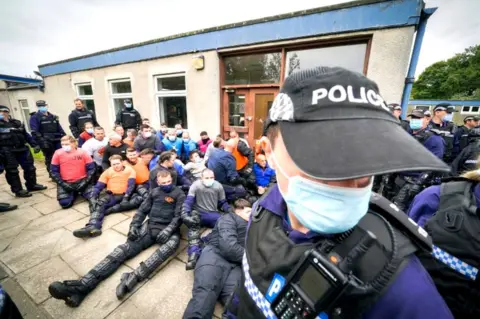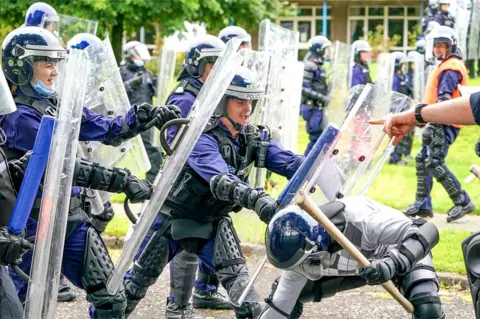COP26: Riot training for thousands of police ahead of summit
 PA Media
PA MediaThousands of police officers are being given riot training in the run-up to the COP26 summit in Glasgow.
The global event, which will see world leaders arrive in the city this November, is expected to be policed by about 10,000 officers a day.
Specialist public order training is being given to thousands for what will be one of the biggest police operations the UK has seen.
Police Scotland said it would facilitate safe and peaceful protest.
Officers from around the UK will be deployed during the international conference, which is expected to attract protesters in large numbers.
During August and September, roughly 2,500 public order officers in Police Scotland are to be trained.
An exercise involving hundreds of officers was held at Cragiehall barracks near Edinburgh on Monday.
 PA Media
PA MediaThe simulation put police officers wearing riot gear into a real-time mock protest, with other officers playing the role of demonstrators from a group called "Destruction Uprising".
The "protesters" took part in a sit-down demonstration outside a bank, which began peacefully before becoming more confrontational, with objects being thrown at a line of officers.
Mounted police were also used in the exercise, while the officers moved to disperse the group and use riot shields to defend against attackers with baseball bats.
'Quite intimidating'
A group of politicians and campaigners were invited to the training day, with some taking part in the role of police or protesters.
Scottish Labour MSP Monica Lennon donned the boiler suit, helmet and body armour of a public order officer as she joined the police lines.
She told the PA news agency: "It's heavy, it's warm, I'm covered in egg and all sorts of things.
"But it's been good to see what it's like for the police in these sorts of situations."
She added: "It was quite intimidating - having to eyeball protesters even though it was pretend."


Police Scotland's response to public incidents is under greater scrutiny than ever before but that will move into a different league come COP26.
The world's media will be watching how the force engages and deals with a disparate coalition of campaigners and protestors.
Everyone from schoolchildren and organic farmers to the direct action activists of Extinction Rebellion will want to make their voices heard.
The force says it will take a human rights-based approach, facilitating people's right to peaceful protest, while minimising disruption to the wider Glasgow community and clamping down on any serious disorder.
A coalition of more than 100 organisations is hoping up to 100,000 people will march through Glasgow on November 6 but many other protests will take place, particularly when the world leaders are in town.
In 2005, when the G8 met in Scotland, helicopters flew riot police into the grounds of Gleneagles Hotel and there was sporadic violence on the streets of Edinburgh.
COP26 will be a different beast from the G8 but public anger and concern over climate change is growing and a repeat of such scenes can't be ruled out.
Senior officers have said that so far they have no intelligence that anyone is intending to cause trouble but they're preparing for it just in case.

 PA Media
PA MediaDeputy Chief Constable Will Kerr said: "Police Scotland is a rights-based organisation that puts our values of integrity, fairness, respect and a commitment to upholding human rights at the heart of everything we do.
"This means that we will protect the rights of people who wish to peacefully protest or counter-protest at COP26, balanced against the rights of the wider community.
"The whole aim is to minimise disruption to the wider community as much as we can. We understand entirely that people will come and they will want to protest on an issue of real significant global importance.
"We welcome them, we will facilitate and protect their right to do so. But we want to do so safely and we want them to do so peacefully."
He said the force would provide a "proportionate policing response" and that the force was already engaging with known protest groups to ensure their rights to peaceful assembly and protest were met.

He said the police would focus on de-escalation in a demonstration like the one simulated at Cragiehall.
He added: "What today is about is preparing a greater number of officers in Police Scotland for the small minority who might not want to come and protest peacefully, who might want to disrupt the life of the city and engage in disorder.
"For that small minority we want to make sure we have the fullest range of tactics available."
Asked if Police Scotland could rule out the use of undercover officers in protest groups, he said: "In the very unlikely circumstances that we would deploy them, the accountability regime in the use of those tactics is incredibly and rightly onerous."
 PA Media
PA MediaQuan Nguyen, Scotland coordinator of the COP26 Coalition, which is organising protests in Glasgow, across the UK and worldwide this November, said: "Protest and dissent are vital to a healthy democracy, and are how human rights and justice have always been won the world over.
"Without protest, the political will to act is just not there. The rights to protest, freedom of assembly and freedom of expression are protected rights which the police have a legal duty to defend.
"People must be able to challenge the most exclusionary and least transparent COP ever held, otherwise we stand no chance in tackling the deadly climate catastrophe currently wreaking havoc across the planet."
He urged people to join the protests for climate justice on 6 November.
